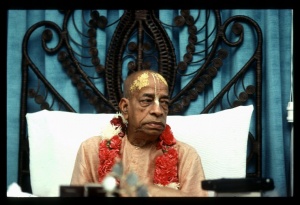SB 2.1.10

A.C. Bhaktivedanta Swami Prabhupada
TEXT 10
- tad ahaṁ te 'bhidhāsyāmi
- mahā-pauruṣiko bhavān
- yasya śraddadhatām āśu
- syān mukunde matiḥ satī
SYNONYMS
tat — that; aham — I; te — unto you; abhidhāsyāmi — shall recite; mahā-pauruṣikaḥ — the most sincere devotee of Lord Kṛṣṇa; bhavān — your good self; yasya — of which; śraddadhatām — of one who gives full respect and attention; āśu — very soon; syāt — it so becomes; mukunde — unto the Lord, who awards salvation; matiḥ — faith; satī — unflinching.
TRANSLATION
That very Śrīmad-Bhāgavatam I shall recite before you because you are the most sincere devotee of Lord Kṛṣṇa. One who gives full attention and respect to hearing Śrīmad-Bhāgavatam achieves unflinching faith in the Supreme Lord, the giver of salvation.
PURPORT
Śrīmad-Bhāgavatam is recognized Vedic wisdom, and the system of receiving Vedic knowledge is called avaroha-panthā, or the process of receiving transcendental knowledge through bona fide disciplic succession. For advancement of material knowledge there is a need for personal ability and researching aptitude, but in the case of spiritual knowledge, all progress depends more or less on the mercy of the spiritual master. The spiritual master must be satisfied with the disciple; only then is knowledge automatically manifest before the student of spiritual science. The process should not, however, be misunderstood to be something like magical feats whereby the spiritual master acts like a magician and injects spiritual knowledge into his disciple, as if surcharging him with an electrical current. The bona fide spiritual master reasonably explains everything to the disciple on the authorities of Vedic wisdom. The disciple can receive such teachings not exactly intellectually, but by submissive inquiries and a service attitude. The idea is that both the spiritual master and the disciple must be bona fide. In this case, the spiritual master, Śukadeva Gosvāmī, is ready to recite exactly what he has learned from his great father Śrīla Vyāsadeva, and the disciple, Mahārāja Parīkṣit, is a great devotee of Lord Kṛṣṇa. A devotee of Lord Kṛṣṇa is he who believes sincerely that by becoming a devotee of the Lord one becomes fully equipped with everything spiritual. This teaching is imparted by the Lord Himself in the pages of the Bhagavad-gītā, in which it is clearly described that the Lord (Śrī Kṛṣṇa) is everything, and that to surrender unto Him solely and wholly makes one the most perfectly pious man. This unflinching faith in Lord Kṛṣṇa prepares one to become a student of Śrīmad-Bhāgavatam, and one who hears Śrīmad-Bhāgavatam from a devotee like Śukadeva Gosvāmī is sure to attain salvation at the end, as Mahārāja Parīkṣit did. The professional reciter of Śrīmad-Bhāgavatam and the pseudodevotees whose faith is based on one week's hearing are different from Śukadeva Gosvāmī and Mahārāja Parīkṣit. Śrīla Vyāsadeva explained Śrīmad-Bhāgavatam unto Śukadeva Gosvāmī from the very beginning of the janmādy asya (SB 1.1.1) verse, and so Śukadeva Gosvāmī also explained it to the king. Lord Kṛṣṇa is described as the Mahāpuruṣa in the Śrīmad-Bhāgavatam (Canto Eleven) in His devotional feature as Lord Śrī Caitanya Mahāprabhu. Śrī Caitanya Mahāprabhu is Lord Kṛṣṇa Himself in His devotional attitude, descended on earth to bestow special favors upon the fallen souls of this age of Kali. There are two verses particularly suitable to offer as prayers to this Mahāpuruṣa feature of Lord Kṛṣṇa.
- dhyeyaṁ sadā paribhava-ghnam abhīṣṭa-dohaṁ
- tīrthāspadaṁ śiva-viriñci-nutaṁ śaraṇyam
- bhṛtyārti-haṁ praṇata-pāla bhavābdhi-potaṁ
- vande mahā-puruṣa te caraṇāravindam
- (SB 11.5.33)
- tyaktvā su-dustyaja-surepsita-rājya-lakṣmīṁ
- dharmiṣṭha ārya-vacasā yad agād araṇyam
- māyā-mṛgaṁ dayitayepsitam anvadhāvad
- vande mahā-puruṣa te caraṇāravindam
- (SB 11.5.34)
In other words, puruṣa means the enjoyer, and mahāpuruṣa means the supreme enjoyer, or the Supreme Personality of Godhead Śrī Kṛṣṇa. One who deserves to approach the Supreme Lord Śrī Kṛṣṇa is called the mahā-pauruṣika. Anyone who hears Śrīmad-Bhāgavatam attentively from its bona fide reciter is sure to become a sincere devotee of the Lord, who is able to award liberation. There was none so attentive as Mahārāja Parīkṣit in the matter of hearing Śrīmad-Bhāgavatam, and there was none so qualified as Śukadeva Gosvāmī to recite the text of Śrīmad-Bhāgavatam. Therefore, anyone who follows in the footsteps of either the ideal reciter or the ideal hearer, Śukadeva Gosvāmī and Mahārāja Parīkṣit respectively, will undoubtedly attain salvation like them. Mahārāja Parīkṣit attained salvation by hearing only, and Śukadeva Gosvāmī attained salvation only by reciting. Recitation and hearing are two processes out of nine devotional activities, and by strenuously following the principles, either in all or by parts, one can attain the absolute plane. So the complete text of Śrīmad-Bhāgavatam, beginning with the janmādy asya (SB 1.1.1) verse up to the last one in the Twelfth Canto (SB 12.13.23), was spoken by Śukadeva Gosvāmī for the attainment of salvation by Mahārāja Parīkṣit. In the Padma Purāṇa, it is mentioned that Gautama Muni advised Mahārāja Ambarīṣa to hear regularly Śrīmad-Bhāgavatam as it was recited by Śukadeva Gosvāmī, and herein it is confirmed that Mahārāja Ambarīṣa heard Śrīmad-Bhāgavatam from the very beginning to the end, as it was spoken by Śukadeva Gosvāmī. One who is actually interested in the Bhāgavatam, therefore, must not play with it by reading or hearing a portion from here and a portion from there; one must follow in the footsteps of great kings like Mahārāja Ambarīṣa or Mahārāja Parīkṣit and hear it from a bona fide representative of Śukadeva Gosvāmī.